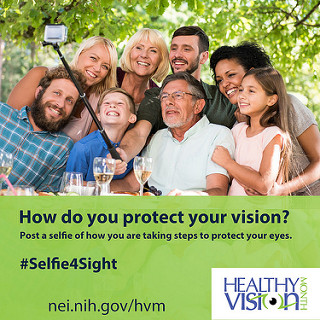 It’s Healthy Vision Month! Make Your Eye Health a Priority Women are more likely to have eye-related diseases and conditions, including cataracts, glaucoma, and age-related macular degeneration. Nearly two-thirds of blindness and visual impairment occurs in women, and women make up the majority of the 4.4 million Americans age 40 and older who are blind or visually impaired. You may be busy, on the go, and caring for your family, but it is important that you make the time to take care of you! During Healthy Vision Month, held each May, the National Eye Institute (NEI) reminds you to make your eye health a priority and encourages you to take five important steps to protect your sight.
It’s Healthy Vision Month! Make Your Eye Health a Priority Women are more likely to have eye-related diseases and conditions, including cataracts, glaucoma, and age-related macular degeneration. Nearly two-thirds of blindness and visual impairment occurs in women, and women make up the majority of the 4.4 million Americans age 40 and older who are blind or visually impaired. You may be busy, on the go, and caring for your family, but it is important that you make the time to take care of you! During Healthy Vision Month, held each May, the National Eye Institute (NEI) reminds you to make your eye health a priority and encourages you to take five important steps to protect your sight.
Get a dilated eye exam. Getting a comprehensive dilated eye exam is the best way to know if your eyes are healthy and you are seeing your best. Talk to your eye care professional about how often you should have one. If you want to see what your eye care professional sees during a dilated eye exam, check out NEI’s eye exam animation!
Live a healthy lifestyle. Eating healthy foods, maintaining a healthy weight, managing chronic conditions, and not smoking can lower your risk of eye disease. You’ve heard carrots are good for your eyes, but eating a diet rich in fruits and vegetables, particularly dark leafy greens such as spinach, kale, or collard greens, is important for keeping your eyes healthy, too. Research has also shown there are eye health benefits from eating fish high in omega-3 fatty acids, such as salmon, tuna, and halibut.
Know your family history. Talk to your family members—including parents, grandparents, aunts, and uncles—about their eye health history. It’s important to know if anyone has been diagnosed with an eye disease, since many diseases are hereditary. This will help to determine if you are at higher risk for developing an eye disease yourself.
Use protective eyewear. Protect your eyes when doing chores around the house, playing sports, or on the job to prevent eye injuries from happening. This includes wearing safety glasses, goggles, safety shields, and eye guards that are made of polycarbonate. Eyewear should sit comfortably on the face, so talk to your eye care provider about the appropriate type of protective eyewear for your sport or job. Make a habit of wearing the appropriate type at all times, and encourage your teammates and coworkers to do the same.
Wear sunglasses. Wear sunglasses outside to protect your eyes from the sun’s ultraviolet rays. When purchasing sunglasses, look for ones that block out 99 to 100 percent of both UVA and UVB radiation, so you can keep your eyes healthy. Prolonged exposure to sunlight can increase your risk for getting an eye disease like cataracts or age-related macular degeneration. A wide-brimmed hat offers great protection, too!
These steps can help you keep your eyes healthy and prevent vision loss and blindness from eye disease.
To learn more about Healthy Vision Month and find additional eye health information, visit www.nei.nih.gov/hvm.
I like your recommendations to use protective eyewear whenever it’s recommended. It makes sense that your eyes are one of the most essential functions of the body so keeping them in good working order would be helpful. I’ll have to keep this in mind even if it’s something like sunglasses because I don’t want to cause damage to my eyes.
I like that you mentioned getting exams done by a professional. I would recommend having them checked up at least once a year. You may want to get checkups more often if you notice something change or have a history of eye problems in your family.